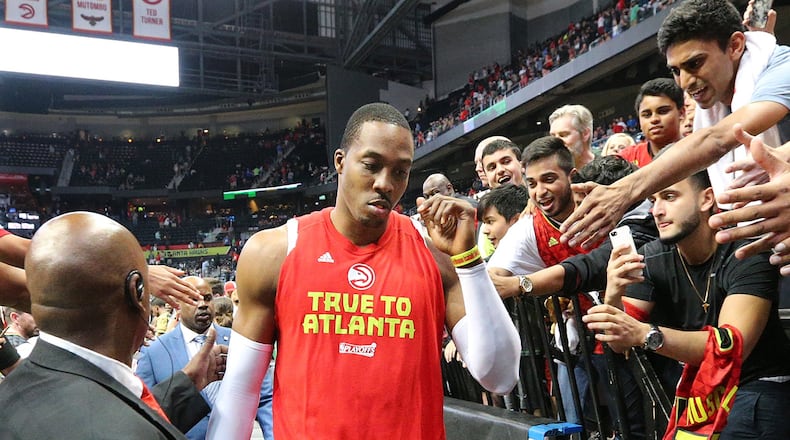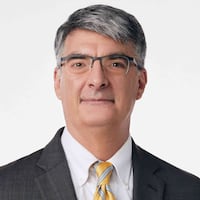The Dwight Howard era is over in Atlanta.
What many considered an unmovable contract was indeed movable. The Hawks traded the Atlanta native Howard to the Hornets late Tuesday night in the first move by new general manager Travis Schlenk. The deal returned Miles Plumlee and Marco Belinelli. The teams also swapped second-round picks in Thursday's NBA Draft with the Hawks sending No. 31 for No. 41.
Here’s what the Howard deal means:
1. The Hawks are rebuilding
For a team that has made the playoffs 10 straight seasons, the longest active streak in the Eastern Conference, the successful run is in jeopardy. Principal owner Tony Ressler and Schlenk have both said they would like to continue to build the Hawks into a championship contender but remain relevant. That may not be the case in the short term. Without Howard and the real possibility of losing four-time All-Star Paul Millsap to free agency, the roster as currently constructed is not a playoff team. With Howard and Millsap last season, the Hawks managed a 43-39 record and a fifth playoff seed. Without the two, the Hawks are not a top eight team in the East. It’s also possible the Hawks could lose Tim Hardaway Jr. as a restricted free agent. That’s three-fifths of the starting playoff lineup that may not be back. The Hawks have young players to build around with Dennis Schroder and Taurean Prince. It’s possible that Schlenk can get the Hawks back into playoff contention next season through the draft and free agency. However, for now make no mistake, there is construction to be done.
2. Roster flexibility
Schlenk has preached roster flexibility from the moment he arrived. He abhors what he considers bad contracts and wants deals that are tradeable, if and when, a chance to improve the roster is presented. In his statement following the trade, Schlenk said: “It is extremely important for our organization that we maintain our flexibility and this trade helps us achieve that critical goal.” Howard had two years and $47 million left on his contract. That was considered a bad contract, especially for a player nearing the end of his career and stuck to the bench in late-game situations. Yes, the Plumlee contract is bad too. However, there in only $37.2 million remaining on that deal.
3. The future of Bazemore
If Schlenk wanted to move on from the Howard contract, he may consider the same with Kent Bazemore. It is possible he considers the Bazemore deal a bad contract. The wing signed a four-year, $70 million deal last summer. There are three years and more than $54 million remaining, including a player option in 2019-20 for more than $19 million. Bazemore still has upside. Although he lost his starting job to Hardaway near the end of the season, Bazemore has shown growth in his game when not slowed by injury. The dilemma for Schlenk here is that he is unlikely to pay major money for both Bazemore and Hardaway next season. Depending on an offer and decision on Hardaway, Bazemore could be next to be moved.
4. No starting center
The Hawks don’t have a starting center. In fact, the only center on the roster would be Plumlee, who averaged less than three points per game in a reserve role with the Bucks and Hornets last season. Others who played center last season – Mike Muscala, Ersan Ilyasova and even Millsap – are all unrestricted free agents. The Hawks could take a center in the draft. However that player won’t likely be ready to step right into a starting role. The search will be on in free agency.
5. Unclear roles
The acquisitions of Belinelli and Plumlee leave the future of Mike Dunleavy and Muscala in doubt. Dunleavy, a shooter off the bench, has a partial guaranteed deal. He will make $5,175,000 next season with a reported $1.5 guarantee. Muscala may not be resigned for a role as a second or third center with Plumlee on the books for $12.4 each of the next three seasons. Muscala is versatile with an ability to play away from the basket – something coveted in the NBA. Belinelli could be traded again with an expiring contract of $6.6 million.
6. Salary cap savings
The Hawks, in the end, saved some money in the Howard deal. Not a lot but some. The Hawks sent $47 million to the Hornets and returned about $44 million. There will also be the difference in second-round pick salary. The Hawks also have trade exception of $4.3 million. The already have exceptions of $3.3 and $2.2 million.
7. Paul Millsap
If two years and $47 million remaining on a contract for a 31-year-old Howard does not lend itself to roster flexibility, what about Millsap? Millsap is 32. Schlenk has already indicated that Millsap may receive a better offer from another team, a max of four years, $152 million, than from the Hawks, a max of five years, $205 million. The two sides have talked and will talk some more before July 1. They could compromise. Millsap may not want to be part of a rebuilding team. He may get a better offer from a serious contender. Millsap could walk and the Hawks receive nothing. Remember Al Horford? Millsap has stated his desire to remain in Atlanta but that possibility is getting less certain.
About the Author
Keep Reading
The Latest
Featured


